
The Iraqi Ministry of Commerce has not yet agreed to buy the full wheat harvest from the Kurdistan Region. So far, only 400,000 tons have been approved for purchase, which is significantly less than last year’s total.
Regional agricultural officials have repeatedly requested full procurement of this year’s harvest. However, Baghdad has not issued a written response. The request includes forming a technical delegation to visit the capital and negotiate the matter, but approval has not been granted.
The limited decision only allows for the purchase of 400,000 tons, which is half the quantity approved last year. The current price ranges between 800,000 and 850,000 dinars per ton. This has caused frustration, especially since production levels are high despite challenges like reduced rainfall.
The allocation divides the approved quota across the region. Sulaymaniyah and Halabja receive the largest shares, while Duhok receives the smallest.
In Erbil, 122,000 tons have been allocated. Local officials have promised to distribute this quota fairly among farmers. However, they also believe the total amount is far too low considering the overall yield.
Sulaymaniyah and Halabja are set to deliver 160,000 tons. Duhok, meanwhile, is limited to 118,000 tons. Many believe this division is unfair and fails to recognize the region’s full production potential.
Efforts are ongoing to ensure that all wheat is purchased from farmers without any imposed quota. Officials argue that the region should be treated equally with the rest of Iraq.
They continue to advocate for a complete wheat purchase from Kurdistan farmers to prevent market losses and economic hardship.
Supporting a full wheat purchase from Kurdistan farmers would not only stabilize rural incomes but also enhance national food security.
The final decision is still pending. Until then, the fate of the wheat purchase from Kurdistan farmers remains uncertain.
